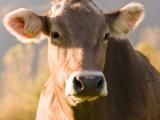Editor's Note: This article, originally published Aug 11, was updated on Aug 12 to include new information from Mexico.
Aug 12, 2003 (CIDRAP News) – The United States has opened its borders to certain ruminant-derived products from Canada, Ann M. Veneman, secretary of the US Department of Agriculture (USDA), announced late last week. The Mexican Ministry of Agriculture followed suit last night. Veneman stressed that the easing of the May 20 ban on all live ruminants and most ruminant products after discovery of bovine spongiform encephalopathy (BSE) in a cow in Alberta was based on a thorough scientific analysis.
"We have a long history of safeguards in place to prevent the introduction of BSE in the United States, and the continued protection of the U.S. food supply is our top priority. Our experts have thoroughly reviewed the scientific evidence and determined that the risk to public health is extrememly low," says Veneman in a USDA press release. Weighing into the USDA's decision were the fact that Canada has safety measures for animal health in place that exceed those set by the Office International des Epizooties (OIE); the exhaustive epidemiologic investigation carried out in Canada of the BSE case, during which no other cases were identified; and additional risk-mitigating measures that have been put in place by Canada in response to a review of their investigation by an independent expert panel, according to the press release.
The items no longer prohibited for import are:
- Boneless sheep or goat meat from animals less than 12 months of age
- Boneless meat from cattle less than 30 months of age
- Fresh or frozen bovine liver
- Vaccines for veterinary use in nonruminants
- Pet products and feed ingredients containing processed animal protein and tallow from nonruminant sources when produced in facilities with dedicated manufacturing lines
In addition, hunter-harvested wild ruminant products intended for personal use will be allowed across the border, beginning immediately.
The USDA announcement was welcomed by the Canadian government and agricultural community, which have suffered massive losses since the BSE case was discovered. "To Alberta's 38,000 beef producers and their dependent industries, one cannot exaggerate the importance of the U.S.'s partial lifting of its ban on Canadian beef. Nor should anybody underestimate the importance of good science and hard work in making it happen," said an editorial in yesterday's Calgary Herald.
The United States is the leading importer of Canadian beef. Observers expect that the USDA's partial lifting of restrictions will encourage similar action from others of the 30 countries whose borders remain closed to Canadian beef; case in point—Mexico, the second-largest importer of Canadian beef, eased its ban on Canadian beef products late on Aug 11, now allowing the same meat cuts and products across its borders as does the United States. One difference between the US and Mexican announcements is that Veneman said the United States would immediately start a "rule-making process" to explore lifting the ban on live cattle from Canada, while Mexico did not.
Veneman noted in her announcement that The United States, Mexico, and Canada intend to request of OIE that they include in their upcoming September meeting of international experts a discussion of practical, consistent guidance to countries regarding resumption of trade with countries that have BSE cases. "It is vital that we pursue this course so that there is consistency among trading partners and assurance to consumers around the world that their food supply is safe," she said.
See also:
Aug 8 USDA news release
http://www.usda.gov/documents/NewsReleases/2003/08/0281.doc
Canadian Food Inspection Agency BSE investigation page
http://www.inspection.gc.ca/english/anima/disemala/bseesb/comenqe.shtml
Previous CIDRAP News stories on the Canadian BSE situation
http://www.cidrap.umn.edu/cidrap/content/fs/food-disease/news/index.html
















